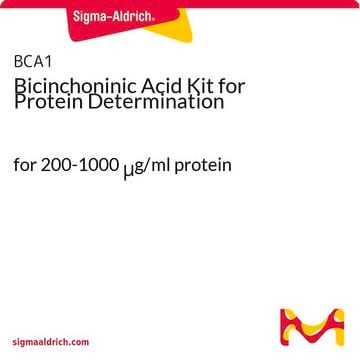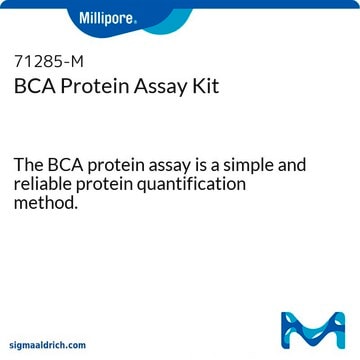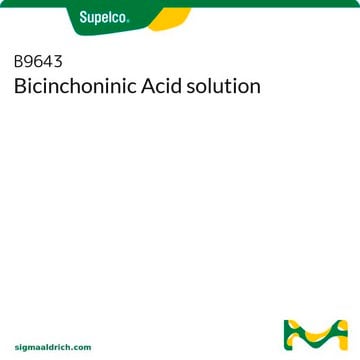P3842
Phosphothreonine-BSA
2 mg/mL, buffered aqueous solution
Synonym(s):
Phosphothreonine Antibody Inhibitor
Sign Into View Organizational & Contract Pricing
All Photos(1)
About This Item
Recommended Products
form
buffered aqueous solution
Quality Level
concentration
2 mg/mL
shipped in
dry ice
storage temp.
−20°C
General description
Phosphothreonine-BSA is a Phosphothreonine antibody inhibitor which blocks the reactivity of anti-phosphothreonine antibody. Antibodies against phosphorylated amino acid can be used as a tool for identification, quantification and immunoaffinity isolation of activated cellular proteins. The product specifically blocks the reactivity of anti-phosphothreonine antibody but does not block anti-phosphoserine- or anti-phosphotyrosine specific antibodies.
Specificity
Working dilution is at least 10 μg/ml by the specific inhibition of the reactivity of Monoclonal Anti-Phosphothreonine (Sigma Product No. P 3555) in ELISA.
Application
Phosphothreonine-BSA can be used in various immunochemical assays like ELISA and immunoblotting for the specific inhibition of the reactivity of anti-phosphothreonine antibodies.
Phosphothreonine-BSA has been used in Pro-Q Diamond phosphoprotein gel staining method to detect phosphoamino acids.
Biochem/physiol Actions
O-phospho-L-threonine conjugated to bovine serum albumin. Phosphothreonine antibody inhibitor specifically blocks the reactivity of anti-phosphothreonine antibody. It does not block the activity of anti-phosphotyrosine or anti-phosphoserine-specific antibodies.
Physical form
Solution in 0.01 M phosphate buffered saline, pH 7.4, containing 15 mM sodium azide.
Disclaimer
Unless otherwise stated in our catalog or other company documentation accompanying the product(s), our products are intended for research use only and are not to be used for any other purpose, which includes but is not limited to, unauthorized commercial uses, in vitro diagnostic uses, ex vivo or in vivo therapeutic uses or any type of consumption or application to humans or animals.
Storage Class Code
10 - Combustible liquids
WGK
WGK 3
Flash Point(F)
Not applicable
Flash Point(C)
Not applicable
Choose from one of the most recent versions:
Already Own This Product?
Find documentation for the products that you have recently purchased in the Document Library.
Characterization of dynamic and steady-state protein phosphorylation using a fluorescent phosphoprotein gel stain and mass spectrometry
Schulenberg B, et al.
Electrophoresis, 25(15), 2526-2532 (2004)
Matthew G Vander Heiden et al.
Science (New York, N.Y.), 329(5998), 1492-1499 (2010-09-18)
Proliferating cells, including cancer cells, require altered metabolism to efficiently incorporate nutrients such as glucose into biomass. The M2 isoform of pyruvate kinase (PKM2) promotes the metabolism of glucose by aerobic glycolysis and contributes to anabolic metabolism. Paradoxically, decreased pyruvate
Our team of scientists has experience in all areas of research including Life Science, Material Science, Chemical Synthesis, Chromatography, Analytical and many others.
Contact Technical Service







